Zhao Qiguang: A 'Marco Polo' from China
Updated: 2015-04-10 11:48
By Hua Shengdun in Washington(China Daily USA)
|
||||||||
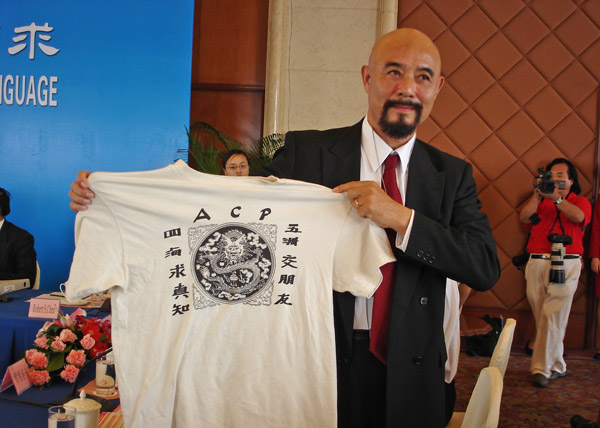 |
|
Zhao Qiguang holding a T-shirt with writing in Chinese:"Making friends from across the world and seeking the true knowledge from over the globe". |
Building cultural bridges
After obtaining his master's degree in English and American literature at the Chinese Academy of Social Sciences in 1981, Zhao applied to about 30 universities in the United States. Because of his love of swimming, all were near water.
With a full scholarship, he went to the University of Massachusetts in Amherst in 1982, and earned an MA and a PhD in comparative literature.
After graduation in 1987, Zhao went to Carleton where he focused on explaining to his students the Tao Te Ching, an ancient Chinese classic by Laozi, the philosopher and one of the legendary central figures in Chinese culture in the 4th century BC. Laozi encouraged a transcendentalism-like philosophy of looking back to nature and being free from desire, which was embraced by various anti-authoritarian movements.
"When we say Chinese culture, it seems we often refer to Confucianism only. There are other aspects, such as Taoism, which emphasizes harmony between human beings and nature, and harmony within man himself," Zhao, who proclaimed himself a "practical Taoist", had told China Daily. "It can be very convincing to people outside China because both confront universal problems of modernization, and we all have anxiety when we are faced with the stress of rapid industrialization."
Zhao believed that the revival of Laozi's philosophy would "insert a thundering crescendo into the symphony of the New Age".
His Chinese classics course became very popular with students, as did other Chinese tradition-related courses he taught, such as The Taoist Way of Health and Longevity.
To Zhao, the way to understand Taoism is to follow the course of nature, understand the harmony between human beings and nature, and establish a healthy mind: "I believe Taoism is a universal ideal and that China can present its ideals of nature, harmony and beauty to the world, and the world will listen."
Zhao published a series of books and more than 100 articles in both Chinese and English, decoding Chinese culture to the Western world. They included A Study of Dragons: East and West, Do Nothing and Do Everything: An Illustrated New Taoism, The Tao that Can Be Told.
One reason for Zhao's devotion to China-US cultural exchanges may have been his concern that international cultural exchanges were being eclipsed by bilateral business and trade.
"When two big powers like the US and China co-exist, we must have a flow of ideas, of knowledge, of personnel, of capital. People live on ideas. Material things disappear but ideas last," he said.
His answer was to take American students to China biennially, enabling, scores of them to see the real China outside of textbooks over the past 30 years.
In 2009, Zhao was invited to lecture at Shanghai-based Tongji University and became director of the school's Chinese culture center.
A year later he was named a "key recommended expert" by China's State Administration of Foreign Experts Affairs for his contributions to bridging China and the US.
"He maintained a modest and authentic personality," said Yu Ying, deputy director of the Chinese Cultural Center at Shanghai's Tongji University. "As a professor, he liked to develop personal companionships with students, which was essential in narrowing cultural gaps."
Zhao Qiguang helped establish the culture center in 2010 after being invited by the university to become a "distinguished professor" the previous year.
"He made it his mission to advance cultural communication between East and West," his elder brother said. "He was one of few scholars who could explain ancient and modern China to American students," said Zhao Qizheng.
Keeping promises
An eternal remembrance that Zhao left for his wife is a collection of several dozen night-owl puppets, which he collected for her each time he made a business trip.
"Zhao loved travel, and even when he was on trip as far away as Mexico, Europe and Asia, he would always call me by phone every day, and he would search for the owl-shaped art for me there," Zhang said. "But we didn't even take a picture together with them."
It was at a party in the mid-Autumn Festival of 1990 in Tianjin, when Zhao and Zhang met for the first time. Then he had been in the US for eight years, and returned to China for only six days to attend an academic meeting. "He was amiable, romantic and a gifted man when I first saw him," she recalled.
Over those six days, Zhao and Zhang met every day, and he wrote her letters.
"It was so romantic. His talent in literature and culture attracted me deeply," said Zhang. "He was such a good-looking and charming man."
Zhao and Zhang moved to Minnesota after they married. Looking back on her years with him, Zhang believes that Zhao was "a perfect man", and a person who "seldom made promises"; but once made, he kept them.
Last year, they went to Key West, Florida, to celebrate their wedding anniversary. Zhao accidentally lost his wedding ring when swimming in the sea. Promising his wife he would retrieve the ring, he dived into the water and eventually got the ring back from a rock on the seabed.
"He was so stubborn, insisting on finding the lost ring in the water, but finally made it," Zhang said.
But on March 13 he didn't.
"The granddaughter born the day after his death was named Zoe, and the Chinese name 'Guang', the same given name as Zhao, both meaning light and life in honor of him," Zhang said.
Sheng Yang, Liu Xiaoxian and Pu Zhendong contributed to this story.

 Journey of a migrant girl from village to ad world
Journey of a migrant girl from village to ad world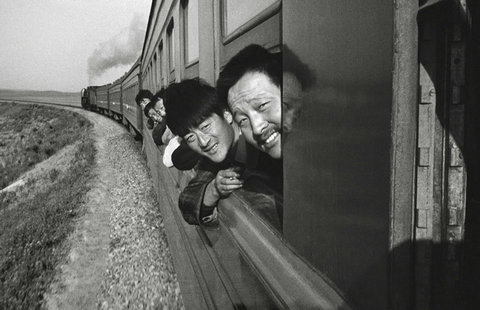
 Photographer captures Chinese on the train
Photographer captures Chinese on the train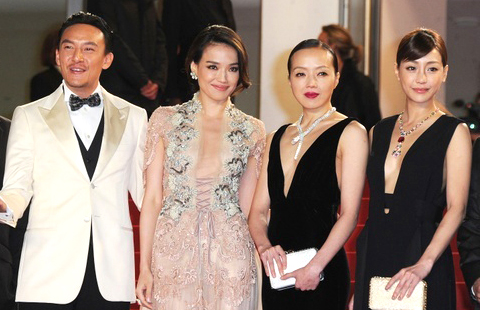
 Hou Hsiao-Hsien's The Assassin premieres in Cannes
Hou Hsiao-Hsien's The Assassin premieres in Cannes
 Top 10 highest-paid white-collar jobs in China
Top 10 highest-paid white-collar jobs in China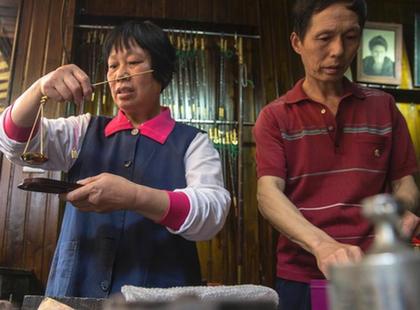
 The dying craft of balance scales
The dying craft of balance scales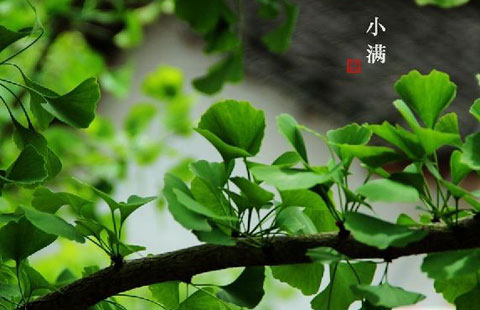
 Culture Insider: Six things you may not know about Grain Buds
Culture Insider: Six things you may not know about Grain Buds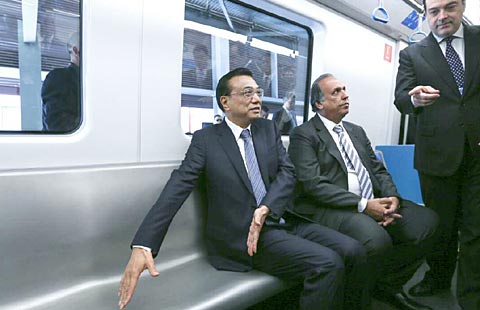
 Premier Li rides on new China-made train in Rio de Janeiro
Premier Li rides on new China-made train in Rio de Janeiro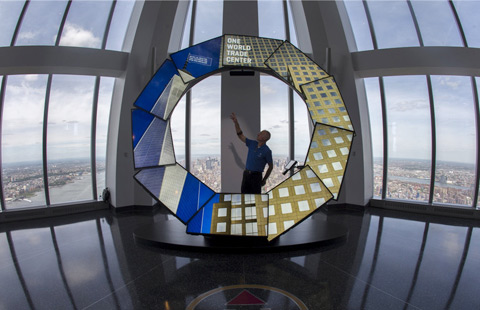
 NYC's new One World Observatory offers sweeping views of Manhattan
NYC's new One World Observatory offers sweeping views of Manhattan
Most Viewed
Editor's Picks

|

|

|

|

|

|
Today's Top News
Li: 'Great potential' for Sino-Colombian ties
Beijing responds to surveillance by US plane
Beijing sets out its rights after reports of incursion
China may have edge in race to build California's bullet train
US Senate votes to move forward fast-track trade legislation
Colombia runs into infrastructure bumps on road to prosperity
Premier Li arrives in Bogota to start official visit to Colombia
China is a global leader in renewable energy: Panel
US Weekly

|

|







